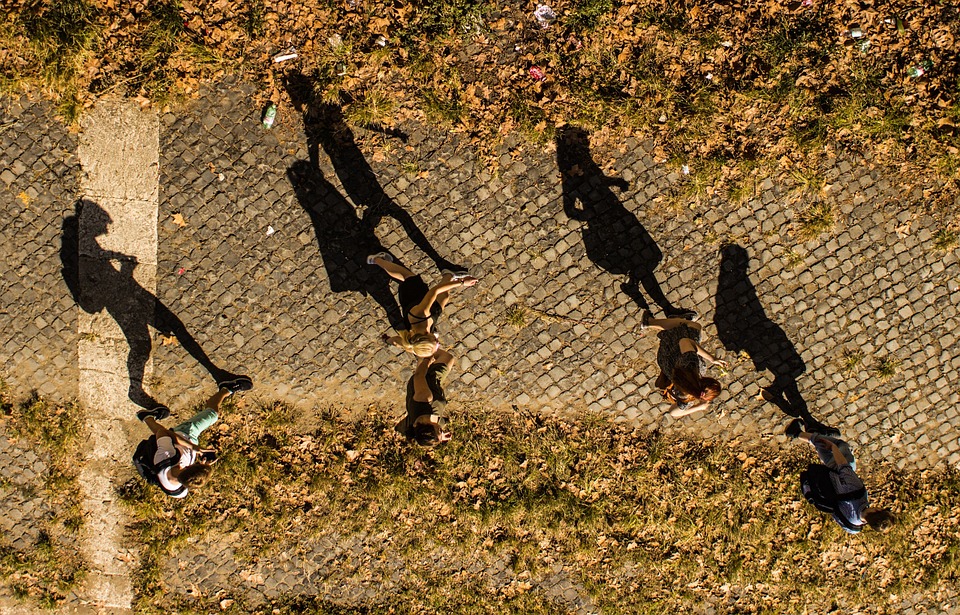These Marvelous, Speaking Bodies
Brad Fruhauff
 These bodies, how they speak. How they signify, the mouth still. How their poise and rhythm scores a city sidewalk, their movements trace meanings on the moist air that separates us.
These bodies, how they speak. How they signify, the mouth still. How their poise and rhythm scores a city sidewalk, their movements trace meanings on the moist air that separates us.
In high school my speech teacher stood before us in his green sweater vest and red knit bow tie and said, “You are never not communicating. Even the attempt to not communicate tells us something about your mind, your mood, your personality.”
My willful spirit revolted, my puzzler brain set to work on this conundrum, but it was insoluble. A hermit in the remote Amazon under a vow of silence has already told us what matters most to him.
Today I pulled my son behind my bike in a trailer, my oldest son riding his bright orange Schwinn several lengths behind us. Holding my arm so, I signal to all around me that we are turning right. Holding my arm so, we are turning left. I point, my son tightens his line along the right side of the street, or against the endless stacks of parked cars. I hold my palm out and point it down; we both slow to a stop.
Even on quiet streets, my senses busy themselves recording and analyzing the world around me. The breeze, faint but essential. The patches of shade cast by oak and maple trees. The grey fist of cloud that must be spitting these few drops of rain. The dog-walker on the sidewalk. The SUV up ahead with its blinkers on. The pickup truck that just turned onto the street behind us. It’s a leisurely, pleasant ride, but it remains my job to keep these boys safe, to preserve the patina of recreation, security. Things work out. We’re always okay. The world is safe and wonderful.
I cross streets slowly, standing on my pedals to make myself tall and obvious, while my son scurries across beside me. The cars notice my peculiar behavior, my odd performance. They consider, they look about, they see the child with me, and they wait for us.
Sometimes the boy lags, so I coast to the middle of the road and wave for him to come along. I can see the drivers turn their heads to seek the addressee of this gesture. My little performance instantiates a homely family drama, invites them in. They look, they see. A dad and his kids out for a ride. Perhaps not unlike they used to do. Perhaps not unlike they will do later today. We all pass safely.
If you showed us a statistic about how much of our social fabric depends on unspoken assumptions, nonverbal gestures, glances of acknowledgment, a nod of the chin, we’d never believe you. It’s too irrational, too loose to analyze, to impossible to quantify.
Some intolerable pragmatist within us would counter that everything has an explanation in self-interest, in the denial of death. Those unwritten laws that bind us to our fellow humans comprise merely the unanalyzable surplus of existence, what matters only after we meet the needs of the day.
I don't think it is Pollyanna-ish to reject the logic of exchange as a metaphor for reality. To reject the cynic’s certainty that suffering defines what’s “really going on.” It’s Pollyanna-ish to accept these views and still to believe we can survive on our sunny dispositions.
It’s a bold, countercultural act of faith to believe that the world is gift, abundance, relationship, story. Every time we step out the door we are like the bird that hops from its nest, certain that with an habitual gesture some invisible force will sustain it, and not wrong to think so, though the world spins it toward its center.
Without that force, we would be little more than a car dealer’s wind-blown dancing stickman, flapping without meaning. And yet, miraculously, even the dancing stickman says, “I am here.”
But the man on his bike, hauling a trailer, says so much more: “I am a father, riding down the streets of my city with my children. I beg your patience as we pass, just as, I hope, I will one day wait for you.”
And I have been the driver in the car, brought to a harder stop by the appearance of the bicycling family, suddenly made aware how absorbed I had become in my own agenda, to the exclusion of my care for the world. The father watches me, understands that I have seen them and will wait, gives me a quick nod with his chin. “Thanks, buddy. We’ll be on our way, now.”
And they pass like ducklings, picking a path to a place they hope, with good reason, to arrive at safely, where they will greet a loved one with the gestures and touches that both ground us and lift us up.